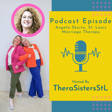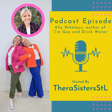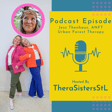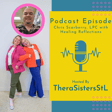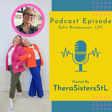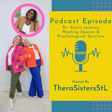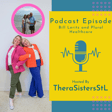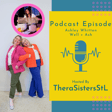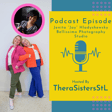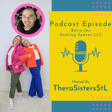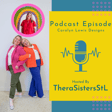Become a Creator today!Start creating today - Share your story with the world!
Start for free
00:00:00
00:00:01

Jasmine Berger Bud to Bloom Play Therapy
We have a fun conversation with Jasmine Berger, the founder and therapist of Bud to Bloom. The therapists at Bud to Bloom use Play Theray to help their young clients and families find their joy.
You can reach Jasmine and her team at Bud to Bloom
Keep following the TheraSistersStL on Instagram @TheraSistersStL or their website TheraSistersStL
Recommended
Transcript
Introduction and Guest Speaker
00:00:00
Speaker
a great way to start hello hello so good morning there sister Catherine good morning there sister Amy welcome welcome yeah I'm excited today our guest Jasmine from the me too
00:00:18
Speaker
Yeah, so how's your day been? Really good.
Personal Loss and Healing
00:00:21
Speaker
Also real quick, you know recently you've been having to heal. So what are some of the ways that you've been feeling the mental beginning process? We put our family dog down sunny yesterday. She crossed the rainbow bridge, but we had a wonderful experience with compassionate and home
00:00:42
Speaker
euthanasia that came over and very kind and it was lovely and she fell asleep but this morning was hard my first day morning back and she wasn't in the window but as far as healing goes I'm just crying when the feelings come and then I move about my day and so yeah and I created a picture book which I think that helps yeah I know that's very important
00:01:07
Speaker
It is. To take that time. Yes. Thank you. Of course. Well, should we dive in? Let's dive in.
Virtual Play Therapy Business Overview
00:01:15
Speaker
All right. So let's bring in Jasmine. Jasmine, come on in. Don't trip in. Yeah, right. Come to our little cozy area. You're cozy. Yes. You're so happy you joined us. You know, so tell us a little bit, just real quick and then we'll get into the fun stuff. Bud the Bloom.
00:01:37
Speaker
Right? It's your little business baby. And tell us more about that. Yeah. So, virtual play therapy is a small group practice. We're in the city and we work with kids zero all the way up to 18 using play-based approaches. So, we really... I'm sorry. At zero? Yeah. We're getting trained currently in this really cool modality called child-parent psychotherapy for kids who experience trauma. And so, it goes as young as zero. And so, that's a lot of working with parents too in this.
00:02:06
Speaker
Yeah, so yeah, we just use play-based approaches to a lot of like art, play, a lot of games, and things like that. Same try. So we use all that to help kids heal and help them connect with their families. I like that. I've got a lot of therapy with kids has to do with parents. The more I'm in the field, the more I realized that when I first started here, it really scared me. It didn't work with a lot of parents. And then as I read more research and grew as a clinician, I was like,
00:02:34
Speaker
If I can, I really like to do parents on the treatment as well. Because you can work with the kiddos, but then you send them home, and they're still just going back to the same situation. Absolutely. Yeah. Because I can imagine too, I mean, we work with adults, and we know a lot of adults who have their own hurts and need to heal through that. So do you think too that
00:03:00
Speaker
when you're working with the kids, you're also helping to heal the parents. Oh, I think there's so much in that, because I think especially when you're playing, it just lights up certain areas in your brain. So I think when parents are getting to play with their kid and connect, and they're getting these joyful, laughing moments, I think that's really healing for all of my parents, too. Especially parents who may be more parent than that way, getting to have that interaction where they're being playful and silly can just be really healing for themselves as well. Yeah. So yeah, silly.
00:03:28
Speaker
Yeah, that's what we're all about. I love it. Laughter is good. Part and part of life. So then silly and taking care of families.
Community Mental Health and Burnout
00:03:41
Speaker
How do you, so you have other clinicians that work in your practice, right? And so do you guys kind of come together and help, like how is that healing or what do you do to
00:03:53
Speaker
heal as a group. Yeah so as a group we have like consultations every month just to talk about hard cases but then we also have like staff meetings every other month where we can kind of do fun stuff together as a team so sometimes we might do art together or do like stands together different things like that so we can have like these fun group experiences to help us grow together as a group and then yeah also I'd love to keep in mind just everybody's mental health and just wanting them to have a really good work-life balance they think that's part of the reason
00:04:19
Speaker
I started Bud to Bloom was because I was feeling very burned out and I really wanted to create this space where people could like have a life outside of work and about the work they're doing. Yeah. So I guess, you know, I'm curious of your journey that brought you to, you know, I want to create Bud to Bloom. Yeah. So I started in community mental health, which I loved, but it was hard, especially for our first job. Those are some of the hardest cases like I've ever worked with and I was
00:04:49
Speaker
the least experience I've ever been. And I loved it. I was working with kids who had developmental trauma, so who had really hard things happen to them at an early age. And that was when I was using a lot of play therapy and getting a lot of like education around play and trauma and how those things can come together. And then I worked in schools for a little bit. And I think after the pandemic, just the needs were so different in the schools. And I feel like
00:05:18
Speaker
It was hard for schools to keep up with the needs. And I just was feeling really, really burnt out coming out of a pandemic, having students have an explosion of needs. And I had been doing private practice on the side and I decided to take it full time. And it's been a really great step. And then we drew in to a group practice shortly after. So that happened here because the pandemic, what, 2020 to 2020? Yeah. So I think I went full time almost two years ago.
00:05:44
Speaker
up in the summer, it'll be three years, and we grew into a group after like one year.
Personal Stories and Reflections
00:05:51
Speaker
Yeah. So who reminds me of who's in the group? Yeah, so right now it's me, it's Molly, another therapist, Brittany, and then we have an intern and we're putting on a really exciting therapist in June as well, so I'm really excited about that. You guys are really growing. Oh, great. Great. Yeah. Well, so I mean, just
00:06:13
Speaker
When you think about healing, even just for you kind of personally, what is really healing for you or helping for you? Oh, I love getting outside. I feel like whenever I get to go to camp and unplug and go hiking, that feels really healing and nurturing to myself. And also just getting out in my garden when I have time to do that or walking my dog and hanging out with them. I'm so sorry about your dogs. I know they're such great mediums.
00:06:40
Speaker
Yeah, it was a good experience. Absolutely. Yeah. So tell me more about your daughter. He's a rescue. He's getting up there. He was like my first big kid dog that I got very grad school when maybe I had no business getting out. Between probably like 10 to 12 now. And he's just an old few guys. I guess I got my first
00:07:07
Speaker
When I was in college, like a sophomore in college early, I don't need a daughter in a sophomore in college, but it was free of good home. It was cute watching you say no to that. So what do you put in your garden?
00:07:24
Speaker
Oh man, I like growing veggies. This year we have not started anything yet. We're in our box. You started sneeze after it and I felt like a real farmer. It was great. Our whole sunroom was just full of like pink cartons and like things filled with seeds. I grew them from seeds, but this year we're going to start because we haven't missed that time period. So yeah, I like to hear lots of lettuces and tomatoes and things like that. Yeah. Oh wow. Some gardening is a healing. Yeah. Seeing your dog out here.
00:07:50
Speaker
Now, do I remember correctly, did you get married in a beautiful church and like it was in an outdoor. Yeah. It is Arkansas. These beautiful like glass and wood churches. And yeah, I got married last year March. Congratulations. Yeah. So it's been a human. Yeah. Yeah. Yeah. Awesome healing. So gardening, I did well, I eat my husband garden. Yeah.
00:08:15
Speaker
and feelings. You grew some stuff. You grew some corn and stuff last year. Wasn't that kind of your thing? It didn't turn out. I mean, it was cool to watch and grow and see. I'm like, this is real corn. My city backyard. It didn't taste very good, but probably because of the chemicals on it. Yeah, but I typically kill things. Or I try to. The ones that I want to kill,
00:08:43
Speaker
don't know. The ones they don't want to kill. Yeah. Yeah. Me and houseplants, we are still trying to figure out our group. Yeah. I feel like I have enough windows for houseplants. I'm really good at growing jalapenos. Okay. So I rather grow the jalapeno. Yeah. That's the one plant that I'm like,
00:09:11
Speaker
That's what I'm doing. You know you're going to have to do it. No, you don't. Yes. Yes. I'm trying a new pepper, but it's a sweet pepper. I heard about it on some show where there's like celebrities and celebrity pepper. Yeah. Well, Jimmy Nardello. Okay. I'm always curious about like those things that like when people are like, Oh my gosh, this is so great.
00:09:41
Speaker
Well, what makes that so much more special or better? Yeah. Or flavorful or then this thing. Yeah. Yeah. Peppers or say a whiskey. Yeah. What's better about this? You know, or a water, you know, whatever. Yeah. So I'll let you know. Yeah. I'll give you some.
00:10:09
Speaker
Well,
Therapeutic Power of Play
00:10:10
Speaker
so, so when you, I want to know kind of what brought you into play therapy, like what are you really excited about working with kiddos? Yeah, that's a good question. I think when I first went to grad school, I thought I wanted to work with adults. And I was like, I really want to work with like, I can't think of the word really pervasive mental health disorders. I thought
00:10:28
Speaker
And then I started doing more learning and I said, that feels too close to home because I grew up with some people with some pretty challenging mental health disorders. And I was like, I don't know if that's what I want to do. And then I did my first crack to come and I was working with kids and I was like, I love this. And then I did an elective crack to come out of therapy at preschool and I just like fell in love. That was the first time I worked under a play therapist. And I was like, this is amazing because I had no idea that you could work with kids that little and like have an impact.
00:10:54
Speaker
And it was really cool to see these kids who had really hard things happen so early on start to heal and grow and it was really amazing. So I was like, I want to do that. That is really cool. And I love playing and I feel like I'm pretty playful and I like kids. I was like, this is all coming together. I love it. Yeah. Well, and so when you say seeing the kiddos heal, like even when you think that you notice that you're like, Oh wow, this is really heavy. Yeah. So I think even there's one type of
00:11:20
Speaker
played their debut, it's called Child Centered, and so it's like where kids kind of get the lead in the room and get to make choices, and it's all about them building up their self-esteem and really feeling like they can make choices and feeling confident about that. So starting with a kid who may be like, we are setting a lot of limits, right? And then watching them not need as many limits, watching them start to self-correct and be like, all right, the sand's supposed to stay in the sand tray. And just growing that impulse control, I'm like, wow, this is like, it's working, it's happening. They're learning these skills and feeling confident in their self, and they have this ability to make good choices.
00:11:49
Speaker
Because so many kids I work with don't really trust themselves anymore. They don't feel like they can make good choices or do the right thing. So it's really cool to have the space that fosters that. That's awesome. Yeah. And I mean, I know that you're dealing with a lot of hard things, but to be able to have that play and those difficult conversations to become accessible and not as scary. Yeah, absolutely.
00:12:19
Speaker
or not even talked about, but you can kind of understand through the conversation. Yeah, absolutely. Letting kids process at their own speed is really important and they can play out what they want or whatever themes they need to kind of move through whatever they're working on. Do you have a favorite like
00:12:36
Speaker
modality like Santa versus... I really love their play. It's my favorite modality. So it's where you're working with a parent and the child and helping them connection. So you're like leading them in all these fun silly activities. And so that therapy don't use a lot of materials because you really want to focus on the connection. So you might just have things like balloons or streamers. And it's so fun and it's so healing to watch just like
00:13:00
Speaker
parents get to enjoy their kid again because again so when you make family sometimes they're after what's in so having a hard time connecting with this child. The child's having a hard time connecting so it's nice to hold this space so they can start healing together and like bringing that joy back to parenting. And then trust again between the parents and the child. Absolutely.
00:13:18
Speaker
You're not just telling me I have to claim that. Absolutely. Yeah, and within Fairplate also helping kids learn how to follow the structure of their parent. Even though it's in silly games, it's helping build those skills for like being able to control their impulses and being able to listen to mom and these really incremental steps that will carry over into like their life at home. So I, that's one of my favorite types of therapy. I'm currently getting certified in it and I love it. I love it so much. Yeah. And I think too, as a parent, it's like nice to know that we're still fun.
00:13:55
Speaker
I think I probably actually go the other way. Maybe I'm not like to like to my own horror. I think that's something that I struggle with is like those boundaries around like what's okay, what's not okay or like
00:14:12
Speaker
me giving my own stuff when you have to put that limit there. Oh, for sure. Yeah. So that's. Yeah. Oh, for sure. Yeah. Yeah. Well, we were saying, Kathryn and I were talking, well, they were over for dinner and our kids were there and our kids have a tendency to just like hang out with us because we are the fun ones. Like we play good card games and we do all that. And it's like, sometimes we're like,
00:14:39
Speaker
We just want to talk about stuff. Go play with your dad. Or even just go outside by yourselves and walk around the block just to like, you know. Well that's so sweet that you guys have those really close relationships with your kids. That's what we can tell ourselves. We like that they like them. Absolutely.
00:15:03
Speaker
And so then do you continue, so with the older kids too, there's play there, like teenagers. Yeah. Yeah. So even it's hard because I was nervous. Like they're playing with teens. I was like, are they really going to want to bop a balloon around with their mom? I don't know. But it seems like every time I do it, I'm always surprised like this 16 year old is having a great time.
Sand Tray Therapy Insights
00:15:24
Speaker
I'm like, Oh my gosh, they're building connections. It's beautiful.
00:15:27
Speaker
because we also work a lot with foster adoptive families as well. So really helping strengthen that attachment is so key to how those kids do. And I think I'm always surprised that when we give kids the space and the permission to be silly and have fun how much they like take it in, they're like, oh, okay, I can like play in here. So everyone's going to be fun to be here. So I feel like even the TMC plays.
00:15:50
Speaker
you know, that'd be cool. And you can't like enjoy your parents. Of course, if I think change, I don't know, is it changing? Do you think? I don't know. Yeah, I think there's still like teens want to be independent just developmentally, but I think they still need that connection and guidance. So I love being able to make that space. And yeah, yeah. And with a lot of teens, I do kind of like sandtray sometimes because that feels less babyish to them. So the entry can even be used for adults. It's so cool. It's like where you put, you know, miniatures in the sand and create a world and it's
00:16:20
Speaker
Kind of gets at a lot of subconscious stuff sometimes. Love it. It's really cool to see what happens. Even in trainings in Santrae, when you're not trying to go deep, you end up sharing way more. You're like, oh my gosh. I'm just trying to learn. But yeah, I love using Santrae with teens too. Yeah. Or lots of like art as well. We did.
00:16:40
Speaker
Um, when I was in grad school, we did this thing where we did sand trays and it was just, we were in the general public and we were just processing so much. And I was like, it was, it almost feels like magic sometimes, you know, where it's like, they set up things and then they're telling you about it and, and you're like, wow. And just following along with their story. It's just so cool. Yeah. It's so powerful. I love sand tray. Yeah. I've never tried it. I'll have to, yeah, we'll have to.
00:17:07
Speaker
Do some sanitizing. It's definitely a male live healing. So, okay. So two years in and continuing to grow and enjoying all the moments. And so you take on.
00:17:36
Speaker
all of it. Well, try to. Yeah. Right. But so then healing for you, you've got the garden, you've got the walking. Yeah. Any other like special things you do for yourself? I think a lot of my groups that I'm in, in a lot of other therapy groups, I think those are really beautiful spaces because they get the work that you do. And sometimes you can just like share, like I had a week where I heard a lot of really hard things and they can sometimes also hold that space. So I think having those spaces where I can like
00:18:06
Speaker
talk about my job. Obviously not anything confidential, but we're going to talk about the things that are happening at work that feel really challenging. It's really helpful. I think for helping me like process and like compartmentalize a little bit and I'm not taking everything home with me, but I think that's really important for me to feel well. Yeah. And it's nice to have other therapists who understand, right? Yes. There's understanding that's so important. Yeah. Yeah.
00:18:36
Speaker
I don't know. Do we need to ask about any glimmers recently, right? In your life of glimmers. Tell me. No, tell me. It's kind of.
00:18:48
Speaker
a lot of buzzword, but it's kind of like a thing right now that it's just kind of like people are kind of talking about, but it's just those moments in your life that, that are so small, but they're just a moment where you can just kind of pause and see it. And you're like, Oh wow, this is great. You know, like where it's like, I had, you know, one where it was, Oh, it was yesterday. I had one where I came home and I looked out in the backyard and my mom and my daughter were like playing
00:19:12
Speaker
Table some game they made up table tennis together and they were just bold giggling and I just walked in and I saw that I was just like this is so great Yeah, like that was just a very sweet moment. Yeah, and so for me that was just kind of so that's an idea small or that warms your heart like yeah, and also I think too it can be something where you're like Wow, I've grown. Yeah, you know like oh I don't do this anymore or I've learned from this and
00:19:42
Speaker
And yeah, yeah, so anything recently, I'm trying to think too, I did not come prepared for with a glimmer today, but yeah, some biggles.
00:20:00
Speaker
Well, and even just this, the fact that it's like, well, let me pause and think, you know, where it's like, I have to kind of search for that. I think if we keep the idea of glimmers almost at the forefront of our minds, then we'll notice them more. And because they're such like a warm feeling and a wonderful thing that the more we can notice that, the softer our life is. Yeah, I feel like definitely.
00:20:25
Speaker
Anything you want to share? Me and my partner are really goofy. We were cooking dinner last night and we had a little dance party and we were listening to some throwbacks. It just felt like a very sweet little, like, this is fun. It's great. It's so good. I'm curious of the throwback feature. We just love early 2000s. We were just listening to a lot of early 2000s music. It was good.
00:20:52
Speaker
and you get to dance around and connect and play. Yeah, and be playful. Yeah, so. It's super, super sweet. Yeah, it's awesome. I do love it. Those are kind of some of my favorite moments with the radio on and just kind of creating. Yeah. Yeah, those are always like silly moments, yeah. Yes. Yeah, on the forefront of my mind, so it was yesterday, a hard day, but my son, it's nice to see
00:21:20
Speaker
your children do thoughtful things like totally on their own and so they offered to like give us clips of hair of Sunny and um it's kind of like you know we don't need that we've got pictures and I have other things but they did have some shavings but so he's like oh I want some I'm like oh okay and so he took some and he collects rocks
00:21:47
Speaker
And so he had these little plastic things with foam. And so he like grabbed three and he put Sunny's fur in each one so he could have one. I could have one and my husband could have one. I'm like, oh my God, you are so sweet. I hate to say this, sometimes you forget or you don't see it. And then they do something and it's a little clever, right? Like using a thoughtful human being.
00:22:17
Speaker
those moments that warm your heart, right? Dancing with your partner and making bread or remembering music. I'm all over the place. Oh, you're fine. Music, play therapy, does it come in? Yeah, some of my teens, especially, I let them play me music that they like and then we'll talk about it. Yeah, so sometimes that's like a nice way to build rapport because sometimes like they're
00:22:45
Speaker
I'm like, let's do some of your favorite songs. Play them for me. Tell me what you liked about this or sometimes we'll build like a coping playlist together.
Importance of Play for Teenagers
00:22:54
Speaker
Things like that. So yeah, I think you can definitely come into play for sure. If kids really like music or I know one of our therapists in the office.
00:23:01
Speaker
She likes to do dance parties if they had a really hard session. So at the end, just having like, all right, let's put on Olivia Rodrigo or Taylor Swift, and they might have a dance party to kind of just re-regulate after like maybe talking about a hard thing or shaking it off and get it out of there. So yeah, we definitely like to use music with kids who are into it. Yeah. No, that's awesome. Music is so powerful. Oh my gosh, yeah. Dr. Reese Perry talks about how like rhythm, repetitive things are really good for healing trauma.
00:23:30
Speaker
a lot of stuff we also like to do is just like drumming on our legs and things like that, super silly, just like activities just to really bring that rhythm and regulation to our spaces too. Yeah. Yeah. And I was just thinking about the being silly part and thinking about teens as well in that this embarrassment of being silly. And I wonder, right, embarrassment is that uncomfortable feeling. And so having them to have an opportunity and a safe place to be silly
00:24:00
Speaker
And to face that embarrassment, I can just imagine it. I don't know. It's just powerful. Oh, I think it's so powerful. Yeah. And just like you were saying, getting that moment to be silly, because teams don't always get that. They don't have recess. They don't play a lot. Even PE in high school was like, that's silly. Or it's like hockey where you're going to get your shins. Wow. I think we all need plays. I'm always happy to like,
00:24:28
Speaker
like getting into something fun or just getting like goofy with me and I love it. And I love adults play too. I think we all need it. I'm curious too because you know my daughter's always asking me to play with her you know and so I often do obviously but you know like for parents who sometimes are like it's hard to get in that space or it's hard to be like
00:24:54
Speaker
Okay, I'll play Barbies with you. You know, like I'm just kind of curious if you have maybe suggestions or just ideas of like getting into that mindset for the parents when it's like, yeah, you just play by yourself. You know, I think there's like a couple of different things depending on what's going on. But I think like I like to tell parents maybe thinking about how they're playing differently. Because I think what would it be like to just really let your child lead the play, right? Like maybe you're just there with them, like,
00:25:20
Speaker
Stating like what they're doing and watching me like oh you're playing with that Barbie Oh, she looks like she's having a good time like what would that type of play look like maybe you're not as engaged in it But you're still really really present and being able to build that connection with them, right? What would that be like so I know for some parents like I just
00:25:37
Speaker
like to maybe give them like a 10 minute burst of like being really in it and then being like, okay, something else now, right? Because a lot of times they're seeking that connection. So how can we like, monopolize it and make it as highly connected as we can? Right? What would that look like?
Child-Led Play and Parenting
00:25:51
Speaker
And that's why I love that fair play because it just gives you silly, short activities to do with your kid. They're like one minute long. And I'm like, you can do it. You can do like a couple of these bursts during the day. They're one minute. Do the silly handshake or do the silly game. So I think those are some things that I like to give parents too. Cause if it's like, gosh, I need to get other stuff done. Like, could you do this really short connective activity? Then go make dinner or whatever it was you needed to do. So your child is still feeling connected and filled.
00:26:17
Speaker
So I think those are a couple things, but I also like to ask parents like what feels hard about the play? Is it because you're with your kid all day? Is it just like you don't feel playful? Maybe you haven't played in a while. I really like sometimes like see like what might be going on there too as well. Sometimes people are just exhausted, which also is fair. Yeah, I always just like that. And the focus. It's just usually your brain different. Yeah, for sure. Well, and so like when you think about when you said child-led, right? Because I know my husband, he
00:26:46
Speaker
he'll be like, Dolores doesn't ever let me like join in or make up stuff, you know? Cause like, she's like, no daddy, it needs to be like, we need to do this. And so like, is that like something that is important to really let down? I think so. Decider can't be so important cause how often are kids getting to make choices, right? This play might be the only time.
00:27:05
Speaker
they're getting down to saying what happens next or where things go. So I think it can be really powerful. I think there's also a space for like adult-led play, right? We can't, not everything can be child-led, but so I think sometimes there's space for like adult playing or like that parallel player and adult leading the play, but I think it's really beautiful to sometimes just let your child lead and see where it goes and like just being there with them being present and not trying to change it, just accepting whatever weird thing you're doing. Yeah, so I think, yeah, definitely there can be space for that too,
00:27:35
Speaker
It's nice for kids to have that moment to be like, yeah, that's Barbie. She's going to sit here. Yeah, I chose that. And that's where they're going to stay. She's just going to walk. My Barbie's watching a movie. And that's the whole play. So I did a movie. Yeah, some people have interesting sessions where kids will just do like one thing and they're like, OK, all right, this is where we're at. This is something that they needed to do. That's fine. It's enough. Yeah. I like that idea of like the
00:28:04
Speaker
Handshakes and the quick moments. Yeah, and also like just like five minutes or ten minutes Yeah, because I think sometimes it's like I don't have like 30 minutes. Absolutely. Yeah, and my focus is not It's a Barbie or yeah trucks or yeah. Yeah. Yeah, but to the worst I just watched parent trap and they have a that special handshake. I was like
00:28:26
Speaker
We need a special handshake. And she's like, yeah, mommy, we do, but we still haven't made one yet. So we have homework. Yeah. So we appreciate you coming on here and the newer way of doing things. Do we have like, are we going to do a question? We're still figuring things out. So we're trying to ask.
00:28:53
Speaker
the world, you know, the world. Our 235 followers. Like questions that they would have for healers and therapists. So, you know, if you know anyone, they can send us some questions. Absolutely. But we just have this fun little, not 10. Well, so the question, right? So what we want, what we're putting out there in that world is
00:29:21
Speaker
if you, if anyone has any questions they've ever wanted to ask a healer or if anyone's ever worked with a therapist and they get questions they wanted to ask their therapist. We're like, let's do it here. You know, the uncomfortable stuff or the personal stuff or the hot stuff or, you know, just those kinds of things like this can be a space for that. And I think that makes, that helps make therapy that much more accessible and that much more like forever.
00:29:50
Speaker
right? We go to the bathroom probably after each session every hour. So you've got, I think, are these questions or do we have these? I think these are, I don't know. Are we also, I think you pick one and then we all kind of talk about it. And if it's, if we don't like it,
00:30:19
Speaker
Yeah, there are no... Is there one suggestion to make to all of your clients? One suggestion to all... So maybe something that can be... thoughts.
00:30:37
Speaker
Since I am a very big attachment-based therapist, all of my clients in some way are far more talking about acting with their kids. I think that's one suggestion I make of all my clients is different ways of like how can we like
00:30:50
Speaker
bolster up that connection because we know that we feel connected and safe behaves in ways that we like. Yeah I think that's typically one of those questions I make kind of across the board is just like how do we boost connection even for older kids if they feel more connected.
00:31:07
Speaker
more likely to talk to you about those hard things. And like, that's what you want. We don't want kids learning about things just from their friends without any adult guidance. So the more connections you can build early on, the more they're going to still come to you and like help guide them through those harder parts of life as well. So I think like all the ages I work with, that's always something I'm suggesting in multiple ways is how can we like connect with this kid? How do we foster connection and like relationship that's
00:31:31
Speaker
you know, where they feel like they can come to without getting in trouble or being really putative. Yeah, I think that's one of those things just fostering that connection and that like joy and relationships and that shared fun together just to help build those, building lots of having a healthy relationship throughout their time. Yeah. No, I like that. I mean, you could even say that to adults too. Oh, for sure. Yeah. On the foster connection in their life. Yeah. I mean, honestly,
00:31:57
Speaker
Right? Isn't that what life is? Really just the connection that we have with people. And yeah, that's what makes life. It's powerful. And that's so much in line with the work I do too. There are many couples.
00:32:14
Speaker
you know, tuning in to their connection growing up or lack of connection growing up and how it affects their personal relationships and romantic relationships as adults. And so when you're saying like, building that connection, are there maybe ways that we can really tell, oh, we're connected or is it more just even asking the kiddo? Like, what is the way to engage that? I think it's just like thinking about like,
00:32:41
Speaker
these moments of like, how I like to look at it sometimes, right? Are you having these moments of like shared attention and shared joy? Like where your pulse, it feels like you're on that same wavelength, you're in the moment together, you're experiencing a thing together, right? If you're having those moments with your kid, if you're not, maybe like there's something that's going on that's making that really challenging, either for your child to do or for you to do, but you're having some of those moments where it's like, we're both in it, we're fighting with this Barbie really intensely, or maybe we're going on a block and we're both looking at the trees together and we're sharing this attention and this joy together.
00:33:10
Speaker
Like, if you're having lots of those moments, I feel like that's probably a good sign. And if you're not, that could be for a lot of reasons. Maybe your kid has had some trauma, so that feels too vulnerable to do, right? Those moments of being really connected can feel scary for kids who've had hard things happen. Or they can just be things maybe if you were parented differently, you just don't know that that's something that should be happening, right? So I think like those little shared moments are so key, and that's a lot of things like what we're looking to create in our offices, and helping those happen outside.
00:33:44
Speaker
I think I pretty much share with all my clients the importance of just being in the present, right? And as often as we can, hopefully more often than not, right? Because that's where we are. And just the importance of just experiencing this moment, right?
00:34:07
Speaker
like I am experiencing you and your wonderful words and face and experiencing you and your great questions and just kind of being here, present. For me, I mean, there's so many, but like to choose one, right, is I think I would say kind of slowing down, right? Being able to take that moment and slow down in the moment and really experience and give space to what's happening for me, you know,
00:34:37
Speaker
When there's moments where things get big, where emotions get heavy or strong or hot, it's like pausing in that moment and being like, what is this? What is this for me? What am I feeling? What am I experiencing? Because I think when we can slow down, we can also choose how we want to react. And so that's what I would say is kind of that slowing down piece.
00:35:06
Speaker
I love it. I love it. We got it. We have solved it.
00:35:24
Speaker
Yeah. So I don't think you'll get better than that. Tell us to kind of pull this around. Just tell us, how can people find you?
Contacting Bud the Bloom
00:35:33
Speaker
How can people get in contact with you? Absolutely. So we have a website, buds of blue, playtherapy.com. That's probably your first happen point. You can fill out our little form and our amazing intake coordinator. And we'll get back with you. Yeah. And
00:35:50
Speaker
Well, I know this is gonna air a little greater, but if you have events that are coming up, or if you have things that people could pay attention to. Oh, amazing, yes. Mental health pain is coming up, so we're putting on some fun events, because we think that parents are a huge part of how kids' mental health is doing. So for Mental Health Awareness Month in May, we're putting on some fun events. So I think on Wednesday, the first we have a fun, just like it's proud to play time. So that's just like a child-led playtime where your kid can come play with other kids.
00:36:19
Speaker
and parents can come connect. And then we're also doing a connective caregiver and child group. So kind of based on that play idea where you're getting these fun activities, kids ages two to five and their caregivers can come and learn some fun ways to connect and get to play together and play with other kids. So yeah, those may be some things to look out for.
00:36:37
Speaker
those groups are they kind of open? Yeah they're open because they're not therapeutic groups they're just more so just like open just with experiences to just play and have fun together so yeah. And so is it gonna be every Wednesday or just? Yeah so for this month it's just that one Wednesday with Lauren and then we're doing one connective play group on the 22nd maybe. And then we're hoping to do them more regularly
00:37:06
Speaker
Not like in the summer. Okay. Yeah. We'll see. This is our name. Thank you guys for having me. This was really fun. Thank you. Thank you for sitting on our cushion. I guess we're just sitting at all day now. Thank you guys. So, we are TheraSystemsSTL. I'm Catherine Barton, Amy, Camp Ryan, and thanks to Jasmine for visiting us today. Yeah. Thank you. And what do we need to say for us?
00:37:35
Speaker
Check us out on our website, this podcast, like and follow, subscribe, and FersistersSTL. Yeah. So we look forward to continuing the podcast and having more wonderful guests.
